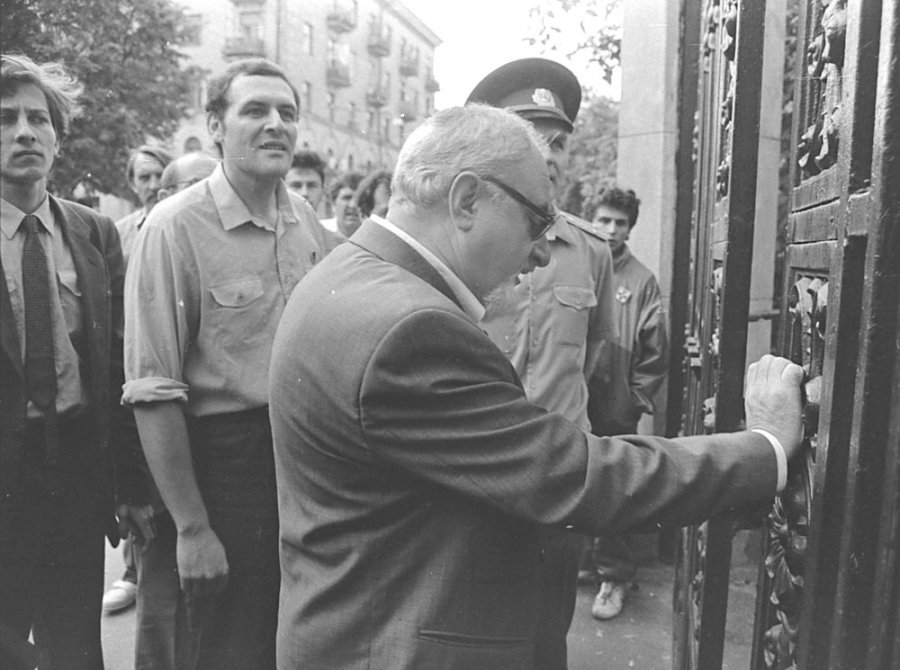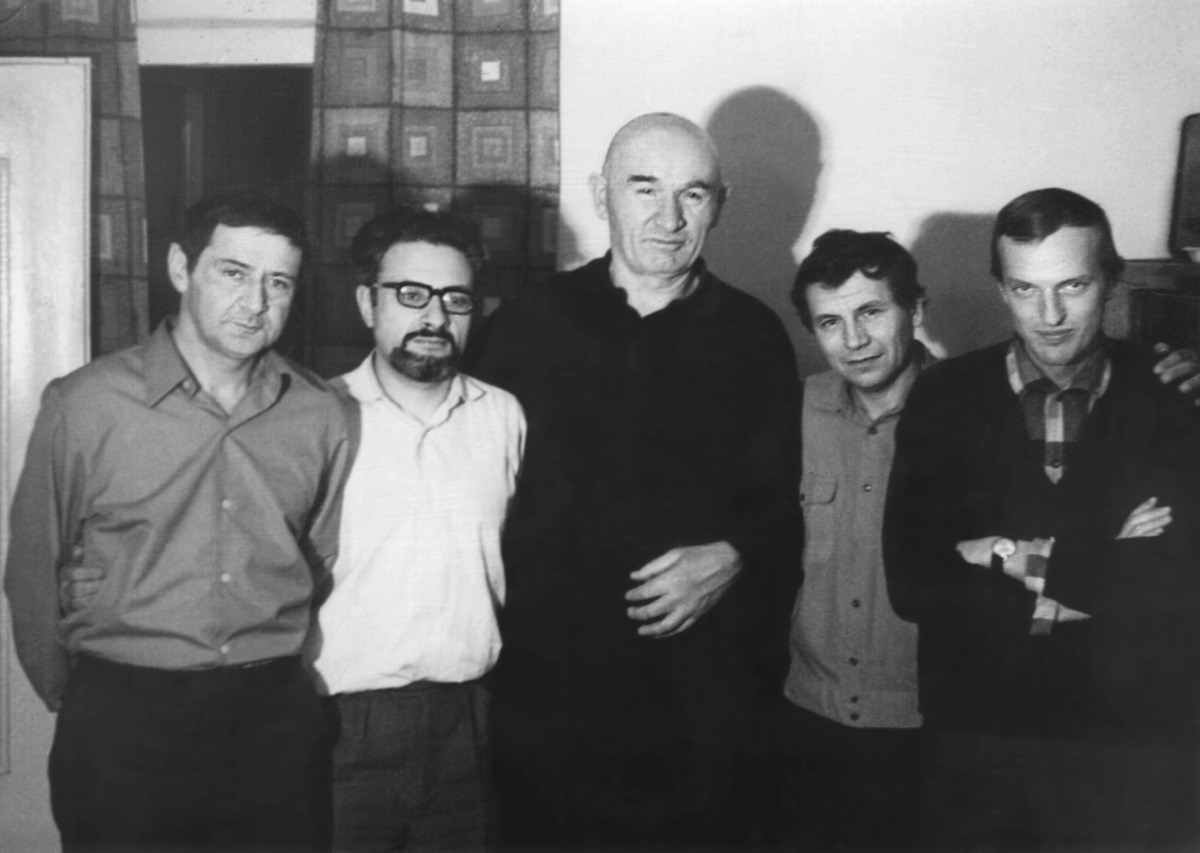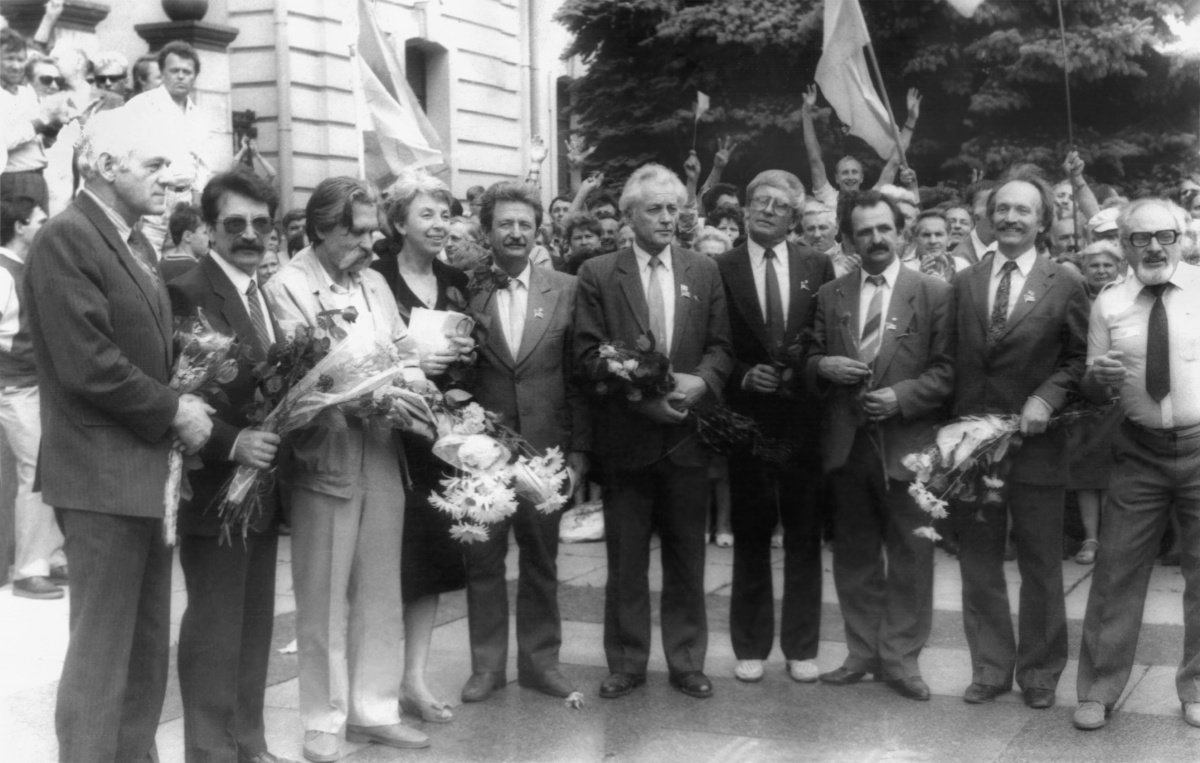
Henrich Altunyan (in the foreground), with Yevhen Zakharov behind him near the doors of the obkom (regional committee building).
On November 24, my dear friend Henrich Ovanesovych Altunyan (11/24/1933–06/30/2005)—Henchyk, as everyone called him—would have turned 90.
We met in 1972, shortly after he and three of his fellow defendants—Arkadiy Levin, Vladyk Nedobora, and Volodya Ponomaryov (here they are in the photo with Petro Hryhorovych Hryhorenko)—had completed a three-year prison sentence. We met them and their whole company, which Borys Chychybabin nicknamed the Pavlopolska Brazhka almost all of them lived in a Kharkiv district called Pavlove Pole. And we became fast friends. We met often, passed samizdat to one another, and argued about all sorts of things.
By the age of 35, Henrich had built a brilliant career. A military radio engineer, a major, and a lecturer at a higher military aviation engineering school, he was about to defend his dissertation. And it all came crashing down in a single moment: in May 1969, Henrich signed a letter in defense of General Hryhorenko, who had been locked away in a psychiatric hospital in Tashkent. For four hours, his superiors tried to persuade Altunyan: Take back your signature, and nothing will happen. But Henrich refused—честь — она всего превыше (he really loved this song by Yuliy Kim). He was dismissed, expelled from the Party, and imprisoned. Of all the signatories, only the four from Kharkiv were jailed. Another six signatories from Kharkiv were administratively persecuted: fired from their jobs, demoted, and so on.

Petro Hryhorenko (center) and the four Kharkiv residents who received three-year sentences for signing a letter in his defense: Arkadiy Levin, Henrich Altunyan, Vladislav Nedobora, and Volodymyr Ponomaryov.
Henchyk was a remarkable man. Not only because he was never afraid of anything and always stood by his convictions, but because of his unique attitude toward people. He was an infinitely kind person, always ready to help his friends and acquaintances. He also helped complete strangers who found themselves in trouble. And there were always plenty of people who needed his help.
Henchyk was constitutionally incapable of not only changing his convictions but even of hiding them. It was precisely because of his complete disregard for the power of the criminal communist authorities and his outspoken irrepressibility that he was under constant surveillance by the KGB, whose officers simply hated him. Kind, charming, and boisterous in a southern way, he was the center of Kharkiv’s dissident circle, and as soon as the attack order came from Moscow—out of fear that Polands Solidarity movement might be repeated in our country—Henchyk was arrested again on December 14, 1980.
He was tried for his words, for possessing samizdat. Even his court-appointed lawyer said during the trial that he could find no evidence of a crime in his client’s actions. The trial itself was an outright farce and provoked a reaction opposite to what the KGB had intended: instead of fear, it led to the shedding of all illusions about the authorities among those who still had any.
I wrote to him constantly until his release in March 1987. At first, he was in the political prison zone No. 36 in Kuchino, Perm Oblast. For his participation in the political prisoners’ struggle against the camp administration, Henchyk was constantly in and out of the SHIZO (punishment cell), and as a result, his camp regime was changed to a prison regime: they sent him to Chistopol Prison for three years. In confinement, he wrote poems, some of which I included in a collection we published in his memory for the 40th-day memorial service. This collection contains a detailed biography, friends reflections on his death, interviews with him, and poems dedicated to him.
After his release, the authorities were so afraid of him that they removed him from the train three times when he intended to travel to Moscow. I witnessed this, and I would wait for him to be released from the police station at the train terminal. He was only able to travel around the country later, when the situation had changed.
In 1990, he became a deputy of the Ukrainian parliament, where he did a great deal for the adoption of the law on the rehabilitation of victims of political repression.

Deputies of the Verkhovna Rada, former political prisoners, on the day of the proclamation of the Declaration of State Sovereignty of Ukraine on July 16, 1990. From left to right: Levko Horokhivskyi, Oles Shevchenko, Levko Lukianenko, Iryna Kalynets, Mykhailo Horyn, Stepan Khmara, Bohdan Rebryk, Bohdan Horyn, Viacheslav Chornovil, Henrich Altunyan.
During the August Coup, Henchyk received daily information from Moscow on his fax machine about the events in the country, and I would make copies, distribute them, and read them at the rally in the square. There was no other fax machine in Kharkiv at the time. I have described these events in more detail here.
We were in Memorial together, and he often visited the KHPG. All those years, he was a friend and an advisor.
In the fall of 2004, Henchyk became one of the leaders of the Kharkiv branch of the Committee of National Salvation. During the Orange Revolution, from November 21 to December 8, he hosted all the rallies in Kharkiv in support of Yushchenko.
Henrich always radiated energy and a love for life he never complained about his health. He had enough life in him for ten people, and his senseless death from complications after a failed surgery was simply impossible to believe. More than 18 years have passed since then, and all these years, the feeling of how much he is missed has never left me.